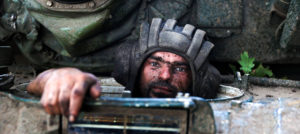Europe’s web of alliances has always been almost incomprehensibly tangled. This is one of the reasons we still disagree so vehemently about the causes of the First World War: the assassination of Franz Ferdinand lit a fuse woven from a million threads. It is one of the reasons, too, why the Western media is paying little attention to a confrontation currently brewing in the south Caucasus. Iran, Azerbaijan, Turkey, Armenia, and perhaps even Israel are all teetering on the edge of a devastating conflict — one that could send shockwaves across the rest of Eurasia.
Tensions between Iran and Azerbaijan have been rising since the start of the year. In March, the latter became the first country with a Shiite Muslim majority to open an embassy in Israel. Iran, having the largest Shiite majority of any nation, and being Israel’s historic geopolitical nemesis, did not approve. Nor did it approve, in 2020, when Israeli-made Harop drones proved crucial in helping drive the Azerbaijani military towards victory over Armenia in the shockingly underreported Second Nagorno-Karabakh War. Ties between Israel and Azerbaijan have grown increasingly close, and with Russia — traditionally the dominant regional power in the Caucasus — distracted by its engagement in Ukraine, Tehran fears that the balance of power is shifting in favour of Iran’s enemies.
Specifically, the Iranians are concerned that Azerbaijan might allow the Israeli military to use its territory as a launch pad — just as America feared Russia’s use of Cuba in the Cold War. The Azeris ruled out the possibility in March. But this has done little to calm tensions. Since January, a series of confrontations has driven relations between Iran and Azerbaijan to an all-time low that some fear could place them on the path to war.
Fazil Mustafa is a member of Azerbaijan’s parliament, and one of the nation’s most outspoken critics of Iran. The day before his nation opened its new Tel Aviv embassy, he was shot in Baku, the capital of Azerbaijan. Mustafa survived the assassination attempt, which the country’s foreign ministry appeared to blame on Tehran. Following his discharge from hospital, he emailed me to say there should be little doubt as to who orchestrated the attack against him. “All the suspicion and evidence obtained points directly to Iran,” wrote Mustafa, “because it doesn’t seem likely that such an act could have been committed against me from another source.”
It is difficult to independently verify these claims, which Iran denies. But, if true, it would be the second time this year that the country has attacked an Azerbaijani political target. In a separate incident, on January 27, a gunman stormed the country’s embassy in the Iranian capital, killing its head of security and wounding two others. Baku quickly suspended its diplomatic mission in Tehran and recalled its staff, although its consulates in other Iranian cities remained open. Azerbaijan’s President, Ilham Aliyev, has since blamed the Iranian government for the embassy attack. Tehran claims that the gunman was driven by “personal motivations”.
A long history of enmity lies behind this tense relationship between the two nations. Although they both have predominantly Shiite populations, the Azeris are a Turkic people and Azerbaijan’s ethnic ties to Turkey have underpinned its foreign policy ever since it regained its independence from the Soviet Union in 1991. The Republic of Azerbaijan’s founding president, Heydar Aliyev (father of the current leader), has previously described Azerbaijan and Turkey as “one nation, two states”. This irritates the Iranians, as Tehran sees Ankara as a regional rival.
Relations are further complicated by Iran’s marginalisation of its large Azeri minority. More ethnic Azeris live within Iran’s borders than in Azerbaijan itself: the community is estimated to number anywhere between 15 and 40 million people. They are the second-largest ethnic group in Iran, and are treated with great suspicion by the national government, which fears Azeri secessionism in the country’s North-West.
Iran accuses Azerbaijan of stoking separatist sentiment in the country, which Baku denies. But this has done little to calm nerves in Tehran. It was a similar — and similarly widely-ignored — geopolitical paranoia that drove Russia to invade Ukraine last year. A failure to treat the Iranian threat more seriously could have similarly devastating consequences.
The more recent antagonism between Azerbaijan and Iran can largely be attributed to the changing geopolitical realities in the Caucasus since the brief war over Karabakh in 2020. Recognised as the sovereign territory of Azerbaijan under international law, Karabakh is home to a large ethnic Armenian minority and was illegally occupied by the Armenian military for more than a quarter of a century before being reclaimed by Baku. The 44-day conflict was suspended by a Russian-brokered ceasefire agreement, but a formal peace treaty has yet to be signed. The leaders of Armenia and Azerbaijan were reported to be resuming talks in Brussels at the weekend.
Tehran enjoys close relations with Armenia, a nation often considered part of “Greater Iran”. Azerbaijan’s victory in Karabakh was, therefore, a setback for both nations: Azerbaijan reclaimed control over part of the highway that links Iran to Armenia, which is a critical trade route that also connects Tehran to the Black Sea and Russia. Azerbaijan has already imposed a steep tax on Iranian trucks carrying goods to Armenia, which it accuses of supplying separatists in Karabakh. Mustafa claims that, as a result of this new threat to its interests, Tehran is actively trying to sabotage the peace process in Karabakh.
“Iran is trying to conduct a very active policy in the South Caucasus. It acts with the idea of filling the vacuum created in the region after Russia’s war with Ukraine,” he writes. “Although Iran does not have the ability to influence the processes in the entire South Caucasus, it has made attempts to hinder the achievement of stability in the region and the conclusion of peace between Azerbaijan and Armenia.” Indeed, it is possible that Iran might provide military support to ethnic Armenian separatists; recent reports suggest that Tehran might supply this nation of “Greater Iran” with the same suicide drones it provided Russian forces in Ukraine.
Emboldened by its military victory in Karabakh — and a stockpile of high-grade Israeli arms — Baku appears unlikely to back down. Further escalation is possible, if not probable. Azerbaijan also knows that it can also rely on the support of its main ally, Turkey. The two countries have a mutual defense agreement in place and, assured by its membership of Nato, Ankara is unlikely to shy away from supporting the Azeris against the Iranians. Were that to occur, Moscow would feel obliged to step into the conflict. It is this risk of entanglement that makes the current standoff so dangerous.
Geopolitical alliances are key to preventing conflicts. They give smaller nations a degree of security against the threat posed by their larger, more malevolent neighbours. However, they can also have terrible consequences. They can cause a conflict to quickly cascade, as was the case in the Balkans in 1914: the Archduke was shot by a Bosnian Serb, which led to a standoff between Austria-Hungary and Serbia that later dragged in Russia before exploding into a world war.
There are a number of reasons why there is a real danger of this in the Caucasus: unlike in Ukraine, where both regional and global powers have refrained from intervening directly against a nuclear-armed Russia, neither Turkey nor Iran are restrained by the danger of mutually-assured destruction. Israel, as a responsible actor that often operates by stealth, wouldn’t use a warhead against the Iranians. And, if Turkey’s military adventurism in the eastern Mediterranean, Syria, and northern Iraq, is anything to go by, Ankara looks unlikely to abandon one of its closest allies.
At the same time, a full-scale war between regional powers in the south Caucasus remains a worst-case scenario, says Michael Doran, the director of the Center for Peace and Security in the Middle East at the Hudson Institute in Washington D.C. “The likelihood of a direct military confrontation is probably limited,” Doran told me. “If a war were to actually break out between Azerbaijan and Iran it would risk bringing in Turkey and Israel against Iran and that, as a military alignment against Iran, is probably the thing Iran fears most.” Tehran would not be able to compete with their combined strength.
Tehran will also be hesitant to escalate the confrontation for fear of provoking an internal backlash from its Azeri minority. What’s more likely is that Iran will utilise more covert tactics to strike at Azerbaijan — tactics that give Tehran a degree of plausible deniability. It has form on this front, Iran has long used proxies to pursue its regional goals, most famously Hezbollah in Lebanon; it supports similar radical Shia elements in Azerbaijan. Mustafa claims that “Iran has allocated major funds for the spread of religious fundamentalism in the South Caucasus … it tries to use mosques, different groups, communities and individuals” to achieve these aims.
With so much international attention focused on the war in Ukraine, this standoff in the south Caucasus has largely flown under the Western radar. Doran is particularly scathing of America’s failures to support the Azeris against Tehran: “This administration in Washington is not viewing Azerbaijan as a counter-balance to Iran,” he says. “That’s because it isn’t looking to counter Iran in any significant way, which is unfortunate.” America has not learned any lessons from Syria, where its failure to properly commit to intervention left the door open for Russia to step in and help Bashar al-Assad cling onto power.
But a war in the south Caucasus could set off a unfortunate chain of events. Since the invasion of Ukraine, Azerbaijan has emerged as a key alternative energy supplier to the EU: between 2021 and 2022, Baku’s gas exports to Europe increased from eight billion cubic meters to an estimated 11.5 billion, and that number is expected to rise to 20 billion by 2027. A military conflict would drastically damage Baku’s production and export capacity. Without Azerbaijan’s oil, European sanctions against Russia might become untenable. In other words, a conflict in the south Caucasus would strengthen Moscow.
Modern warfare is rarely an isolated battle between two states: it is to understand this fact that we teach the First World War. And what was true in the 20th century is even more true now, when our interconnected global economies allow the shockwaves of war to reverberate far away from the frontline. The energy crisis that arose in the wake of the invasion of Ukraine is a vivid recent example. From Washington, London, or Brussels, the Iran-Azerbaijan border might seem like a distant Eurasian hinterland — as the Donbas once did. But it is time we accepted that a faraway war can very quickly come home.
Disclaimer
Some of the posts we share are controversial and we do not necessarily agree with them in the whole extend. Sometimes we agree with the content or part of it but we do not agree with the narration or language. Nevertheless we find them somehow interesting, valuable and/or informative or we share them, because we strongly believe in freedom of speech, free press and journalism. We strongly encourage you to have a critical approach to all the content, do your own research and analysis to build your own opinion.
We would be glad to have your feedback.
Source: UnHerd Read the original article here: https://unherd.com/




